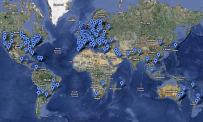
Our united front might be jeapordising the future of funding, says Rachel Briscoe. Photograph: Stuwdamdorp / Alamy/Alamy
A year ago, Arts Council England (ACE) went through a process of deciding which cultural organisations would continue to receive funding and which would not. A friend and I joked about sending anonymous parcels to ACE each containing a pair of scissors (safe children’s scissors to avoid being hauled in on terrorism charges) with a label attached, bearing the name of an organisation that we felt did not deserve to receive any more funding.
We joked about setting up a website called RFOslash.co.uk where people could vote, X-Factor style, on which organisations to get rid of. In the end we didn’t send any scissors or set up a website. There were winners and losers when ACE made its decisions and the people affected were either happy or unemployed.
I want to be very clear that this blog levels no criticism at ACE. I’ve always found its staff to be helpful and straightforward, doing a difficult job well. It sends assessors to see the work of organisations they fund. These assessors are often artists themselves, able to inform their feedback with a genuine understanding of artistic practice. Through this and other mechanisms, it seems to me that ACE try very hard to have a dialogue with artists and listen to informed opinions. Yet, we, the artistic community, don’t make it easy for them.
The theatre community is the sub sector of the community that I’m most familiar with. I run a company called fanSHEN, which is funded on a project-to-project basis – I also work with other organisations, some regularly funded by ACE, as a director and/or producer. From where I’m standing, all elements of the theatre ecology seem incredibly loyal. Even in the face of this year’s savage cuts, we presented a Spartacus-like united front.
No one did propose that anyone else should be cut and this loyalty is something to celebrate. In an environment where support for arts funding is not as unconditional as it is in perhaps Germany or France, we would be doing our sector’s public image no favours by backstabbing and infighting. United we stand. Divided we jeopardise the future of arts funding.
Except I’m not sure. ACE receives its funding from the National Lottery and the Department of Culture, Media and Sport (DCMS). This is public money which comes from taxes paid by all adults earning over the £7,475 annual threshold. So by protecting members of our community who receive public money, then make improper use of these funds, we are sanctioning the misuse of taxpayers’ money. We are allowing a small handful of irresponsible organisations to steal money from ordinary people.
I’m not engaging with the …but is it art? debate here. All art is subjective. There are organisations that produce work a million miles from my own personal taste, but whose appeal to others I appreciate. What concerns me is organisations that spend disproportionate amounts of public funding on people who don’t do their jobs properly and on things they don’t need. If these were private companies dependent on a business model for survival, they would be going into liquidation.
Let me be clear: these organisations are in the minority. The cultural sector is not full of bad apples but they do exist – ask any arts professional off the record and they should be able to give you a top three. But only off the record. So why does this happen?
Firstly, whistle-blowers endanger their future employment prospects and secondly, nobody wants to live in a surveillance state, constantly worrying that the marketing intern or the finance assistant is filing reports to Big Brother. A breakdown of trust is hardly conducive to exploration and creativity: how could organisations take risks if they were paralysed by the fear of someone reporting them to the Arts Council for misuse of public funds?
And then there’s reason number three.
With the complex patchwork of freelance, part-time, fixed term and full-time work that characterises the income stream of many of us who work in the arts, how many of us can honestly say that we’ve never worked for a publicly funded organisation that misuses their funding? Maybe we have even profited directly from this misuse. We don’t say anything about these organisations because if we did, we wouldn’t get paid.
I don’t have any answers. I don’t know how we do the unthinkable and break ranks, or even if it would be helpful in the long run. But I know that through our complicity, we’re playing into the hands of those who argue that all cultural funding is a waste of public money. It only takes one complacent, lazy or irresponsible organisation to discredit a productive, hard-working and vibrant arts community – why take that risk, especially at a time when the government are actively looking for spending areas to cut?
Something has to be done. It has to be more sensitive and more of a dialogue than RFOslash.co.uk or mailing Crayola scissors to Alan Davey. It also has to be something which protects the individual against the negative repercussions of speaking out. I don’t know what it is but I do know that united in this way, we stand for dishonesty, fear and stagnation, not the dynamism and capacity to ask questions that originally drew me to the arts sector.
Rachel Briscoe is creative director of fanSHEN – fanSHEN works in live performance, telling stories of real people exploring big ideas. Follow them on Twitter @fanshentheatre
Source : The Guardian
Filed under: Analyses, Expériences, Financement de projet, Gouvernances, Ingénieries, Politiques culturelles, Action artistique et culturelle, Economie de la culture, Finances publiques, Ingénierie financière, Mécénat, Politiques culturelles








Vous devez être connecté pour poster un commentaire.